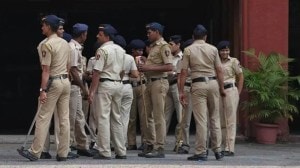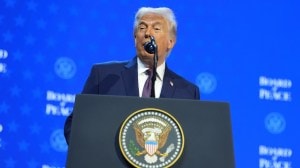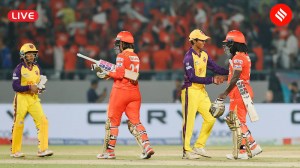We don8217;t seek conflict
Kuldip Nayar is held in high esteem in both India and Pakistan because of his unremitting efforts to bring about greater understanding bet...

Kuldip Nayar is held in high esteem in both India and Pakistan because of his unremitting efforts to bring about greater understanding between the two countries. Even so, his latest article Bellicosity doesn8217;t pay8217;, September 12 is an indication of just how difficult it is for many of our Indian friends to accept the reality of the situation in Jammu and Kashmir.
Nayar states that India made a 8220;concession8221; to Pakistan when the Indian prime minister 8220;recognised General Musharraf as the rightful ruler8221; with whom he might one day be prepared to talk. This, according to Nayar, 8220;would have helped Islamabad to retrieve some credibility in the eyes of the democratic world.8221; However, the fact is that the people of Pakistan have supported the present government8217;s efforts to implement the seven-point domestic agenda in order to ensure that by the time the present government completes its mandate in October 2002, a reasonably enduring platform for a more participatory, institutionalised and sustainable process of democratic governance will have been provided.
Given this response of the people of Pakistan 8212; which is not to deny that some political observers in Pakistan are critical of specific measures of the present government 8212; it would be presumptuous for any external entity to believe it could determine the 8220;rightful ruler8221; in Pakistan, and to offer 8220;concessions8221; and 8220;credibility8221; on such an assumption.
Nayar takes exception to the Chief Executive8217;s reiteration of Pakistan8217;s well-known stand on Kashmir during his Independence Day address and his more recent address to the UN Millennium Summit. He sees this as an expression of 8220;how the military in Pakistan has been thinking all along8221; and of its assumption that through a policy of confrontation it can bring about the disintegration of India.
This is a classic case of distorted perception stemming from mistaken assumptions. The truth is that Pakistan does not seek confrontation with India. But it does seek justice for Kashmir. The majority of the people of Jamp;K, despite their appalling suffering and trauma, have never been reconciled to their forcible incorporation into the Indian Union. The denial of their right of self-determination is something they are not willing to accept, whatever the power equations may be. Moreover, it is a tragic irony that a country which today sees itself as qualified for permanent membership of an expanded UN Security Council should have unilaterally and illegally taken the position that the resolutions of this very body that pertain to Jamp;K are 8220;obsolete8221; merely because it has itself reneged from its obligations and now refuses to implement them.
Pakistan, on the contrary, remains pledged to uphold the right of self-determination of the people of Kashmir as acknowledged by the UN. It does not claim any part of Jamp;K as its own sovereign territory, although it has temporary and acknowledged administrative and security responsibilities in Azad Kashmir. Pakistan will, moreover, respect any final choice of the Kashmiri people that is made in accordance with existing and still valid UN resolutions, and which is made free of coercion.
Pakistan is recognised as a party to the Kashmir dispute by the UN resolutions, the Simla Agreement, the Lahore Declaration and the Charter of the APHC. As such, it cannot be legitimately excluded from any stage of discussions on a Kashmir settlement. By the same token, it has every right to oppose the forcible and illegal suppression of the internationally recognised rights of the Jamp;K people.
Nayar links Pakistan8217;s alleged 8220;proxy war8221; to the 8220;indiscriminate and brutal8221; behaviour of India8217;s security forces in Kashmir. He says 8220;the reason why they are given a free hand is the general belief that they are defending India8217;s frontiers.8221; According to international law and the formal position of every member state of the UN, with the exception of India itself, the territories of Jamp;K are disputed.
As for the 8220;free hand8221; allowed to India8217;s security forces in Kashmir, I would recommend every concerned and sensitive Indian to read the three-part article on Kashmir carried in an Indian newspaper by the Indian novelist, Pankaj Mishra, in order to get a graphic description of what is actually meant by this particularly cynical euphemism.
As long as India remains complacent that its 8220;stamina8221; will not run out and it can therefore indefinitely give itself a 8220;free hand8221; in Kashmir it will be disingenuous to talk about tensions along the LOC. The LOC is the ceasefire line of December 1971 and the Simla Agreement of July 1972 acknowledges it pending a final settlement of Jamp;K through talks between India and Pakistan.
There is only one way to reduce tensions. India must sooner rather than later engage with Pakistan and the Kashmiri resistance for a settlement in accordance with the wishes of Kashmiris. In view of their scale of sacrifices and suffering, the representatives of their freedom aspirations can no longer be denied a place at the negotiating table. Once this is agreed, modalities acceptable to everyone can be worked out. But as long as India refuses to consider this way forward it will only signal a determination to override the wishes of the Kashmiris with the aid of force.
A policy of trying to 8220;isolate8221; Pakistan and undermine the Kashmiri freedom struggle can never substitute for a policy of working towards a just resolution of the Kashmir dispute. The underlying realities and imperatives of the situation in Kashmir cannot be wished away. Trying to do so on the assumption that the Kashmiris are few and Pakistan is 8220;vulnerable8221; will only prolong the agony of the Kashmiris and further strain relations between India and Pakistan.
Despite the undoubted asymmetries of power and size, such a zero sum approach can never bring about a stable and enduring peace in our region which, ever since the events of May 1998, has become a major international concern. While experts may argue the impact of the nuclear factor on military options it can never freeze an unjust situation or render irrelevant the alienation of a whole people. Recent history is testimony to this reality. The inviting prospect of normal India-Pakistan relations and the costs of continuing confrontation, moreover, should impel us to take account of these realities. The leadership in Pakistan has made clear its willingness to peacefully resolve its differences with India. It awaits a response, not as a 8220;concession8221; but as an act of responsibility.
I believe men of eminence and goodwill like Nayar on both sides of the border have a significant role to play in facilitating the emergence of feasible 8220;win-win8221; policies.
The writer is the high commissioner of Pakistan to India
India must sooner rather than later engage with Pakistan and the Kashmiri resistance for a settlement in accordance with the wishes of Kashmiris
- 01
- 02
- 03
- 04
- 05































